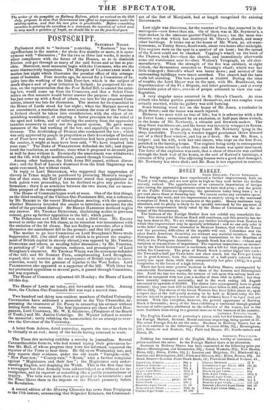POSTSCRIPT.
SATURDAY NIGHT.
Parliament stuck to " business " yesterday. " Business " has two signiftcations in the session : for about five months or more, it is syno- nymous with " discussion • " for the two or three last weeks, it means a silent compliance with the forms of the Houses, so as to diminish friction and get through as many of the said forms and as fast as pos- sible. Moreover, most measures begin with the Commons, who are the more obstructively loquacious. The Marquis of CLANRICARDE made a motion last night which illustrates the peculiar effect of this arrange- ment of business. Four months ago, he moved for a Committee of In- quiry into the working of the Irish Poor-law, which is the subject of much dispute and of great irritation in Ireland : he postponed his mo- tion, on the representation that the Poor Relief Bill, to amend the exist- ing law, would come up from the Commons, and that a Select Com- mittee on that measure would better answer the purpose : that measure has just come up with a flood of others, too late for the proposed Com- mittee, almost too late for discussion. The motion for its committal in the House of Lords stood for last night ; when the Marquis moved as an amendment, a resolution that next session the state of the Poor-law in Ireland should be taken into consideration, with the object of di- minishing mendicancy, of adopting a better provision for the relief of the aged and infirm, and of relieving the country from the oppressive taxation necessary to carry out the present system. He gave many instances of the bad working of the law, and especially of its expen- siveness. The Archbishop of DUBLIN also condemnRI the law ; which was only approved by people in proportion as their knowledge of Ireland or of Poor-laws was small. If a Committee had been granted early in the session, it might at least have been said, " We have inquired into your case." The Doke of WELLINGTON defended the bill ; and depre- cated the resolution, as needless; since what it proposed to do could just as well be done without it. Eventually the amendment was withdrawn ; and the bill, with slight modification, passed through Committee.
Among other business, the Irish Arms Bill passed, without discus- sion; and the Earl of Lucan's dismissal from the Irish Magistracy was again canvassed, but without result.
In reply to Lord BROUGHAM, who suggested that suppression of slavery in Texas might be purchased by procuring Mexico's recogni- tion of that state, the Earl of ABERDEEN stated that negotiations on both points were proceeding, but he declined to give any precise in- formation : there is an armistice between the two states, but no imme- diate prospect of the recognition. The House of Commons began work at noon. One of the first things, on the third reading of the Chelsea Out-Pensioners Bill, was a reference by Mr. BIUGHT to the recent Birmingham meeting, with the question, whether Ministers intended this session to introduce a measure for the relief of the prevalent distress ? Sir HENRY HARDIEGE declined to give any answer. Mr. THOMAS DUNCOMBE, disclaiming malice in previous contest, gave up further opposition to the bill ; which passed.
The Defamation and Libel Bill was read a third time. Mr. Esco•rz moved to strike out the 9th clause, as its retention was inconsistent with the omission of the 3d clause. But not finding a seconder, after a little discussion the amendment fell to the ground ; and that bill passed.
Tke motion to go into Committee on Lord Brougham's Slave-trade Suppression Bill, (the chief object of which is to prevent the employ- ment of British capital in slavery abroad,) was opposed by Mr. THOMAS DUNCONBE and others, as needing fuller discussion ; by Mr. FORSTER, as partaking of " all the caprice, rashness, and presumption " of Lord Brougham's character. Sir THOMAS WILDE was the strenuous defender of the bill ; and Sir ROBERT PEEL, complimenting Lord Brougham, argued, that to connive at the employment of British capital in slave- countries, would be the greatest of injuries to the West Indies. Lord PALMERSTON also appeared as a supporter of the bill. With bitter but not protracted opposition to several parts, it passed through Committee, and was reported.
The House of Commons adjourned till Monday ; the House of Lords till this day.


























 Previous page
Previous page